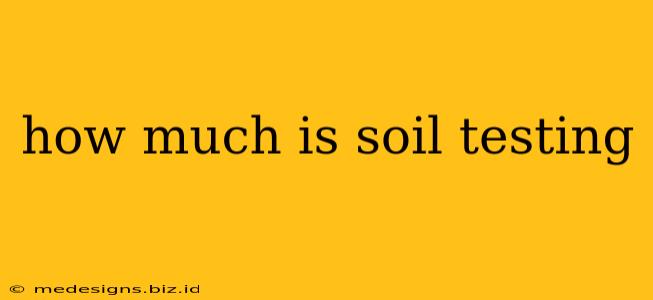How Much Does Soil Testing Cost? A Comprehensive Guide
Thinking about getting your soil tested? It's a smart move for any gardener, farmer, or homeowner wanting to improve their land. But before you dig in, you're likely wondering: how much does soil testing cost? The answer, unfortunately, isn't a simple number. The price varies considerably depending on several factors. This guide breaks down the costs and helps you determine what to expect.
Factors Affecting Soil Testing Costs
Several factors influence the final price you'll pay for soil testing:
-
Type of Test: The most basic tests examine pH, nutrients (nitrogen, phosphorus, potassium), and organic matter. These are typically the most affordable. More comprehensive tests might include analysis for salinity, heavy metals, micronutrients, or specific contaminants. The more extensive the analysis, the higher the cost.
-
Number of Samples: Testing multiple samples from different areas of your property will naturally increase the overall expense. A single sample gives a general overview, while multiple samples provide a more detailed and accurate picture of your soil's condition. Consider the size and variability of your land when deciding on the number of samples.
-
Testing Laboratory: Different labs use different methods and equipment, leading to variations in pricing. Some labs are specialized in specific types of soil or testing methods, which can also affect costs. Shop around and compare prices from different reputable labs.
-
Turnaround Time: Some labs offer expedited service, providing results faster. This quicker turnaround usually comes with an added fee. Weigh the importance of speed against the potential cost increase.
-
Additional Services: Some labs offer additional services like recommendations based on the test results, or consultations on soil amendment strategies. These are valuable but will add to the overall cost. Consider whether these add-ons are necessary for your needs.
Cost Ranges for Soil Testing
While precise pricing is difficult to provide without specifics, here's a general idea of what you might expect:
-
Basic Soil Test: A basic test covering pH, essential nutrients, and organic matter can range from $10 to $40 per sample.
-
Comprehensive Soil Test: A more detailed test encompassing a wider array of parameters, including heavy metals and other potential contaminants, typically costs between $50 to $150 per sample or more.
-
Home Testing Kits: DIY soil testing kits are available at garden centers and online retailers. These are generally the least expensive option, typically costing between $10 and $30, but accuracy may be less precise compared to laboratory testing.
Tips for Saving Money on Soil Testing
-
Group with Neighbors: Pool resources with neighbors who also need soil testing to get a better price per sample, especially when utilizing a lab that offers bulk discounts.
-
Contact Your Local Extension Office: Many local agricultural extension offices offer subsidized or discounted soil testing services to residents. This could significantly reduce your costs.
-
Look for Discounts: Labs may offer seasonal discounts or promotions. Check their websites or contact them directly to see if any are available.
Conclusion
The cost of soil testing varies based on several factors, but understanding these factors can help you budget effectively. Whether you choose a basic test or a more comprehensive analysis, the insights gained will likely be invaluable in improving the health and productivity of your soil. Weigh your needs, compare prices from different labs, and explore cost-saving options to find the best solution for your budget and your soil's needs. Remember to always choose a reputable testing facility to ensure accurate and reliable results.
